When a conversation gets heated, how do you keep your cool and maintain the upper hand?
Mark Joyner taught James how to handle angry trolls and other difficult sorts. Today he lets us in on some of the strong mindset it takes to navigate people challenges and deal with life as it comes.
Podcast: Download (Duration: 56:39 — 52.0MB)
Get Notified Of Future Episodes Apple Podcasts | Spotify | Amazon Music | Android | Blubrry | Gaana | TuneIn | Deezer | Anghami | RSS | More
Episode highlights:
When it comes to learning, nothing beats one-one-one accountability, says Mark Joyner. [01:17]
Who was this guy stirring things up with his divisive Facebook posts? [3:12]
From fearing angry trolls to engaging them head on – this is what Mark’s course did for James. [4:37]
Sometimes rolling with the moment means eating a steak dinner on a podcast. [7:43]
Is there a universal Truth with a capital T? Mark offers his take. [11:10]
It’s time to speak in code – because what you say could get you flagged, attacked, or worse. [16:14]
When the surfboard you ordered is a disappointment, what do you do? [19:49]
The chat takes a detour into matters dietary. [22:31]
People can be hugely fixated on their point of view. Can you express an opinion without lighting fires? [25:21]
Mark talks about the mental shortcuts behind our decisions. [30:33]
Sometimes a rough childhood becomes a blessing later in life. [33:49]
James used to be the argumentative sort. What’s responsible for his current chill? [37:35]
Host and guest reflect on things people once couldn’t talk about, which they suddenly can. [43:49]
Mark suggests viewing the world through a lens of the Stoics. [50:45]
Build a business and a life you love, with James’s help
James has seen Mark Joyner in his workout videos, bent like a pretzel, with someone urging him on to peak performance.
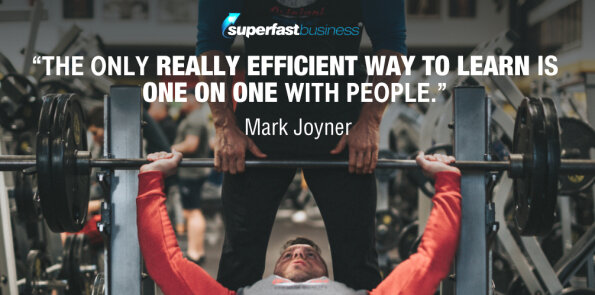 The only really efficient way to learn is one on one with people, says Mark. Having someone in his face produces a 10X improvement in what he learns and how much harder he pushes himself.
The only really efficient way to learn is one on one with people, says Mark. Having someone in his face produces a 10X improvement in what he learns and how much harder he pushes himself.
It’s a great metaphor for business, says James.
An introduction to Mark
James first heard of Mark when he was starting online, and for the longest time, had no idea what he actually did. He thought maybe Mark was semi-retired and got a kick out of stirring things up on Facebook.
Mark would put up these posts that could be deemed inflammatory, and invite opinion. Or he’d put forward a perspective that was divisive, and then step back.
Over time, he’d create frameworks for how he’d like people to respond. James thought, he’s teaching people how to communicate better. And then Mark revealed what he was really about, which was simpleology.
A course in getting things done
Simpleology is essentially an accountability program. It helps people get stuff done.
One thing Mark helped James do was respond to the hate comments he’d receive as an internet marketer. He drip fed James a course which was, James says, transformative. It took him from a place of fear and frustration to a much more confident way of dealing with trolls.
Instead of deleting comments, which the Facebook algorithm apparently doesn’t like, James learned to dialogue with haters in a positive way.
Rolling with the moment
James wants Mark to share some of the same kind of value he got, in today’s talk, which Mark is quite happy to do. He’d forgotten it was a podcast, though, and had been all set to eat a steak dinner as they chatted.
It’s not a first, says James. Noah Kagan ate breakfast on the show. There have been some interesting episodes, like the one where James invited a stranger on a road trip, where they rehashed the Ontraport event they’d both attended.
People who roll with the moment and seize opportunity, says Mark, have an enormous advantage in life. His friend, the late Win Wenger, would talk about the squelcher – the voice in your head that tells you your ideas are dumb. You have to silence that squelcher, and one way is by just moving forward. There’s a whole conversation in that that he and James may have later.
James often has guests back. And he’s responsive to his audience in the sense that he doesn’t tell them what ice cream to eat, but he talks about ice cream they’ve eaten and asks if they want more.
Mark likes that metaphor. It’s probably the only integrous way to teach anything, he says, because who are we to know what’s good for somebody else?
The trouble with Truth
In Simpleology, Mark likes to teach people that epistemologically (epistemology being the study of knowledge), it may be impossible to know a a universal truth, a truth with a capital T. Because to know that universal truth for certainty, you would have to have an omniscient data set in your mind, which as far as we know, we don’t.
Then there are things like Heisenberg’s Uncertainty Principle, in which the very act of observing reality itself changes reality. So how can we know what’s really out there?
Mark has a framework he calls the utilitarian model flexibility. Utilitarian, for a purpose; model, like the model of the universe; flexibility, the ability to switch between one particular model and another at will.
“A lot of our suffering comes from our attachment to ideas.”
This, he says, may be the most important things we all need to learn. Why? Because a lot of our suffering comes from our attachment to ideas. The Buddhists talk about this, as does Alfred Korzybski in the field of general semantics.
Mark illustrates by telling of his stint as an artillery officer. In the artillery world, they used Newtonian physics. Many people today would say quantum physics has disproven Newtonian physics. But for targeting an object 50 kilometers away and hitting it with several guns at once, Newtonian physics did everything they needed.
You might also think of it in terms of lenses. A person with reading glasses doesn’t use them all the time. And in another military example, night vision goggles would be ridiculous at 12 noon.
Turning disappointment into opportunity
It’s fascinating how hard it can be, says James, when someone has a fixed point of view. People who can’t adapt either go down the drain, or snap.
He recalls a surfboard he bought last April to celebrate something. It arrived several months late, and after four failed deliveries. And when he finally got it, the tail was the wrong shape.
He felt the disappointment, and because of the effort it had taken to get the board, tried riding it. But inevitably he spoke to the manufacturer, who offered to buy it back, but with a charge for James’s having ridden it.
James reordered the board, but kept the botched one. He’ll be benchmarking them, he says, on his surfing website, so that surfers will know the difference the tail makes. Most surfers wouldn’t have the opportunity to test two otherwise identical boards against each other, so he’s taking that before he sells the first board.
When people are stuck on their point of view
How do you have proper conversations with people when they’re extremely fixated on their perspective, asks James?
Sometimes, says Mark, people accuse him of posting something divisive. He says, Let’s look at the presuppositions of that statement. Say he posted a true or false question: True or False? Donald Trump’s a stable genius.
How is that divisive? It would in fact seem inclusive, because he’s inviting opinion. To him, what’s divisive would be someone imposing a dogmatic lens on something and condemning anyone who doesn’t agree.
That’s how most people approach things these days, under the influence of media, says Mark. And he was in the intelligence community, so he sees things most people don’t.
Mainstream media is bought off, says James. And Mark says he can prove that.
 People will consume the flavor of media that they’ll consume, says Mark, be it left or right, even though left and right is a very facile way of understanding opinion in politics. But regardless of which flavor of media you might consume, that starts to become your reality.
People will consume the flavor of media that they’ll consume, says Mark, be it left or right, even though left and right is a very facile way of understanding opinion in politics. But regardless of which flavor of media you might consume, that starts to become your reality.
Then there are people who will not change their point of view, and will not be okay with someone who disagrees. Mark, for instance, had someone call him a coward because he didn’t have a firm opinion for or against Trump. He could see the matter through many different lenses, he said. He just wasn’t married to any of them, which upset this person.
Cheat codes and decision-making
James recognizes this from Mark’s training as cheat codes, a shortcut people reflex to.
Mark loves that metaphor. Cheat codes can be inclusive of many phenomena, but there’s a subset worth looking into, because it speaks to a powerful model of persuasion.
There are two different labels for one very similar model. One calls it the Heuristic Systemic Model, and the other the Elaboration Likelihood Model. They are more or less the same thing. That is the phenomenon where, because there’s too much information to process, we use heuristic shortcuts to make quick snap decisions.
In prehistoric times, if you saw a group of frightened people running towards you, you’d likely turn and run in the same direction. This, says Mark, is one of the heuristics we use, sometimes called conformity to group norms.
Why conform? Because more often than not, it could save your life. The trouble is, it could also get you killed. Because people who understand these heuristics deeply are often using them consciously against our best interest.
The childhood-script connection
Mark thought he was cursed with having a very rough childhood. But then he realized later on, he says, it was quite the blessing.
James has seen that a lot. Hard childhood, some sort of drive or inner fire. Entitled childhood, people tend to be a bit complacent. And most definitely, many people are just following the usual script in life.
And that usual script, says Mark, gets you what everybody usually gets, which is mediocrity.
In terms of the way James lived, he says, up until last year, he really felt like an alien. Pull an average person off the street and talk to them about DeFi, or NFT, or the like, they’d ask what you’re talking about. It’s kind of weird being on the early majority side of the fence.
Living in Thailand, Mark goes past untold numbers of people on tricycles off to do their fishing or work in the market. He’s in a completely different world.
“We’re one of 7.6 billion worlds.”
Trevor Toecracker Crook made a great quote on Facebook, says James, something like, We’re not one person in a world of 7.6 billion. We’re one of 7.6 billion worlds.
Some lessons in keeping chill
One of Mark’s best posts, says James, was where he said, Okay, insult me, like, go for it, hit me with your best shot. James thought he was insane. That was his worst nightmare. Because of that post, he reached out to Mark and went through Linguistic Jujitsu Academy.
Mark taught him about having a strong core, about stance, and about having a gentle sword or a hard sword. James sees a lot of hard swords on the internet – people moving off their stance, exposing their weakness and defending it with their life – and going down in flames.
Because of that, James’s main strategy, which he knows may sound weak, is to cut back on socials. He doesn’t get into arguments – it’s not worth it. Two, he has a positive-only rule. He just zips it. And he has his wife to thank. She keeps him humble, and tells him when to just leave a thing.
James was a lot more argumentative 10 years ago. He was battle-hardened and had things to prove. Mark taught him to keep his cool. He reminded James of what he’d already learned from The Art of War, which was to be like water.
If there’s one thing you can take away from Mark, says James, it’s to learn how to handle yourself better in communication. It’s Mark’s superpower among many.
Among the most powerful lessons for James was things you can say to people to defuse certain situations, like asking, Why are you so emotional about this? Or, Why do you feel so strongly about that? That leans into one of the show’s most popular episodes, Just Listen. Plus he did an interview with Rob Moore, who loves haters because they validate the importance of what he does.
Those, plus his surfing, have helped him keep his cool.
“People are going to be on their journeys wherever they are.”
Mark has always found James fascinating, he says. He’s always had a sort of unassuming calm, while a lot of people posing as digital marketing gurus have a kind of edge. And some know what they’re talking about while other don’t, but it’s cool, says Mark. People are going to be on their journeys wherever they are.
Mark got out of digital marketing because of the chaos and being attacked by competitors.
It was all very one-way marketing, says James, when he came online. Red letters, red headlines, sales letters, push, push, push. No accountability. What’s changed is with social media, bandits get pulled up quickly.
“It’s harder to be a fraud on the digital marketing platforms.”
Mark agrees. It’s harder to be a fraud on the digital marketing platforms.
The stuff you can and can’t talk about
It’s an interesting thing, says Mark: let’s say there’s an illness that goes by the same name as a beer from Mexico. And when it first came into the world, it was from a particular region where a lab studied those particular viruses. And anyone who theorized that it might have been leaked from a lab was shunned and ostracized.
The mainstream corporate media was telling people that hypothesis was absurd. In fact, they said, they had a paper signed by 30 senior people in intelligence that it couldn’t have been leaked. As an intelligence veteran, says Mark, he can tell you that’s not what they’re in the business of doing.
Now there is, says Mark, what’s known as the Overton window, the window of acceptable ideas that are allowed to be deposited. And it changes at somebody’s whim. Recently that window was adjusted to allow that hypothesis. And John Stuart, on The Tonight Show, made a big show of saying, Hey, isn’t it crazy that we weren’t able to talk about this before?
There’s a club, says Mark, that can get away with lying, and can lean on titles and authority to tell people their ideas are crazy.
He wrote a book in 2019 that describes a lot of what’s happened in the past two years, and what he thinks will happen in the next several years. There’s stuff he believes people need to know, and he’d love to have that conversation with James.
James will book Mark to come back. He’s too good to let off the hook that easily.
The partnership that went south
James had wanted to talk about a business partnership of Mark’s that didn’t work out. The short version was that it had seemed functional, but then it turned out some foundational promises or credentials weren’t factual.
Mark was gutted and forced to end the partnership. He handled it impeccably, though, says James. And it was vulnerable of him to share what most people would sweep under the rug. It speaks volumes, he thinks, about Mark’s core integrity.
There’s more to it, says Mark, and a lot to learn from the conversation, perhaps more than can fit in this episode.
James has had his share of business relationships that didn’t work. It’s never pleasant, and it may be something someone listening may encounter at some point, which is why it’s important to do due diligence and make sure information checks out.
In the whole time James has been coaching, though, he’s only had one coaching student ask him for proof of bank balance or what his actual numbers look like.
People just assume he’s telling the truth, says Mark.
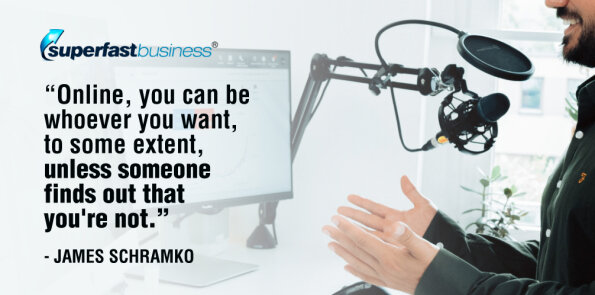 Which he is, says James. But online, you can be whoever you want, to some extent, unless someone finds out that you’re not. Then it’s game over.
Which he is, says James. But online, you can be whoever you want, to some extent, unless someone finds out that you’re not. Then it’s game over.
A useful lens through which to view your life
To wrap up, Mark would like to share a useful lens that is one of the most powerful he’s acquired over his years, in terms of how to process your life in general.
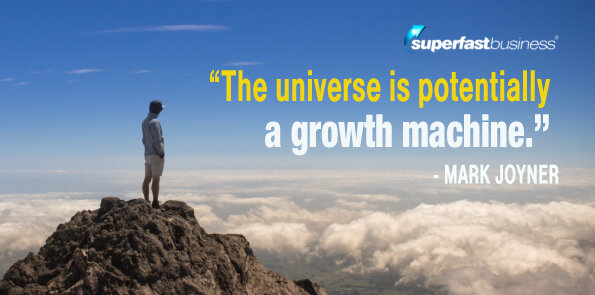 He thinks it was Seneca who came up with the phrase, Amor Fati, which is Latin for the love of fate. The essence of that phrase is that, no matter what happens to you, you need to condition your mind to love it. Because the way he sees it is, the universe is potentially a growth machine.
He thinks it was Seneca who came up with the phrase, Amor Fati, which is Latin for the love of fate. The essence of that phrase is that, no matter what happens to you, you need to condition your mind to love it. Because the way he sees it is, the universe is potentially a growth machine.
Whatever happens to you, if you just trust that it’s for your betterment, even if you, say, lose a hand, if you love that fate, there is some greater good that you’re going to draw from that.
Looking at the universe this way is useful because it will force you to find what good there is in whatever happens to you. So Mark doesn’t mind talking about mistakes that he made at all. He’s not afraid of somebody judging him. It’s okay.
James would love to have Mark back on the show. Mark would love to come back. James can just tell him which of their four or five potential topics they’ll tackle.
James wants to discuss picking good relationships and managing fallout from that, plus some listener contributions.
If you want to know more about Mark, simpleology.com is a good place to start.
Access world-class business resources and coaching inside SuperFastBusiness membership
Liked the show? Leave us a review on iTunes
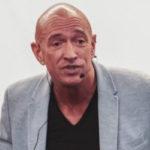
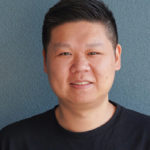







Leave a Reply